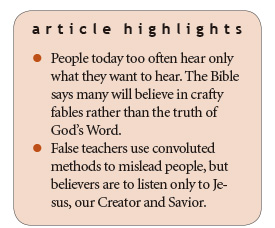The Bible contains abundant warnings against following false teaching. All of them foretell awful consequences for those who don’t test what they hear against the inerrant words of God. There is one warning in 2 Timothy, however, that uses a somewhat humorous metaphor.
For the time will come when they will not endure sound doctrine, but according to their own desires, because they have itching ears, they will heap up for themselves teachers; and they will turn their ears away from the truth, and be turned aside to fables. (2 Timothy 4:3-4)
Every doctor will tell you not to scratch inside your ears. They know it is dangerous. You know it is dangerous. Yet we all (including doctors) scratch our ears when they itch. That’s what the apostle Paul has in mind about false doctrine. The craving starts as a little tickle—some small idea that sounds good or appeals to our humor of the moment. If we ignore the tickle and pay attention to the words of God, the itch will go away. But scratch just a little bit and it begins to consume us. The more we pay attention to the itch, the more it controls us.
When someone tries to tickle your ears with unsound or misleading doctrine, don’t scratch. ![]()
Professional Jargon
People who wish to mislead or confuse others have many techniques at their disposal. The use of specialized terms to cloak meaning is a favorite human trick. Every profession has terminology that keeps out the uninitiated. The military loves its lingo-laden verbs; the government loves its acronyms. Technical descriptions sometimes assume the reader or listener has a complete and comprehensive knowledge of the genre (my favorite is the computer manual), and the “secret” knowledge of the universe is certainly not confined to the mystics!
 One cannot eliminate all specialized terms, but it is possible to communicate without using language only specialists understand—unless one wants to show off or intimidate. In the theological world, this is often done by either spouting terms that only theologians know or falling back on the grand old standard of the biblical languages. The effect is to dominate the conversation with a specialized awareness that forces the listener to give up or acquiesce to the intellectual prowess of the theologian.
One cannot eliminate all specialized terms, but it is possible to communicate without using language only specialists understand—unless one wants to show off or intimidate. In the theological world, this is often done by either spouting terms that only theologians know or falling back on the grand old standard of the biblical languages. The effect is to dominate the conversation with a specialized awareness that forces the listener to give up or acquiesce to the intellectual prowess of the theologian.
In the conflict between science and theology, those who disagree with what the Bible says will often resort to the “I’m right since I am a scientist” argument. Their books are loaded with technical terms—few of which are explained for the layman—giving the impression that the Bible’s words and the biblical context must be understood in light of science. Essentially, one is faced with believing the writer of the book or the Writer of the Book.
Obfuscation
Another misleading tactic is using terminology that gives an impression but doesn’t really communicate. Obfuscation is the technique of making the simple complex and the apparent bewildering. It darkens the light, muddies the clean, and confuses the obvious.
The obfuscator’s goal is to divert the reader from a clear understanding of the issue. Solomon was said to be one of the wisest men God ever blessed. Check out what he had to say about the proper way to deal with information.
And moreover, because the Preacher was wise, he still taught the people knowledge; yes, he pondered and sought out and set in order many proverbs. The Preacher sought to find acceptable words; and what was written was upright—words of truth. The words of the wise are like goads, and the words of scholars are like well-driven nails, given by one Shepherd. (Ecclesiastes 12:9-11)
Obfuscators don’t follow the formula that Solomon speaks of.
We need to be aware of the techniques the Enemy uses to distract us from the truths of God and His Word. ![]()
Intimidation
This technique is used a lot. Those with advanced education—especially from certain schools—often strut their degrees as though they were a pedigree of perfection. Most folks are more enamored by the secrets people know than they are with the things they know. Namedroppers, book quoters, jargon users, prestige vendors, and obfuscators all use the “juice” of specialized knowledge or connections, and their listeners generally drink it up as fast as they can pour it out.
This powerful and subtle lever can tip an opinion to one side or another. The right school is often more important than the intellectual performance. The better the education, it is assumed, the better the knowledge. And the better the knowledge, the more correct the conclusion. These beliefs are only half-truths, but they are embraced as though they were whole truth.
Intimidation is used to gain advantage over others. Two issues to be aware of: one, we are usually taught this technique by watching others rather than learning it as a system; and two, we can hone this skill just like practicing the piano. Initially, people may instinctively use intimidation to win a point. After a while, though, they begin to use it consciously. When it is used against the words of Scripture, our defense is going back to the pure “water by the word” (Ephesians 5:26).
The Symposium of Similarity
Much of the early church’s formal doctrine was debated in councils composed of key church pastors and leaders. Their work was documented in many cases and provided the material from which modern orthodox creeds were developed. A few of the early writers, however, were the source of serious heresy, leading to error and confusion among the churches.
One of the most significant problems in the process was the extension of authority from council to council, compounding any errors from era to era. An early council would establish the creed that would be formally used among like-minded churches. The creed would be based on Scripture but would be composed of carefully worded summaries about scriptural teaching. The next council would take the previous creed and debate the precision of the wording. Their recorded proceedings (usually far more voluminous than the creed itself) would be used by the next council to extrapolate further nuances. Thus, Scripture (A) would be summarized into (B), which would be refined into (C), which then became (D), and (E), and so on. Each iteration would move further and further away from the direct words of God and deeper and deeper into the words of men.
The process became one of comparison of views—something of a democratic analysis of statistical norms—seeking to summarize the summaries and opine on the opinions. Splits and splinter groups were common, and various monastic movements with theological axes to grind popped up. That part is history.
What is not usually understood, however, is that a method was sanctioned by church leadership that is still in practice in seminaries and Bible colleges. Students are encouraged to research the writings of previous experts as much or more than they are encouraged to use biblical exegesis. Graduate degrees of all kinds are built upon the work of earlier scholars rather than original analysis or documentation of new ideas. There is a rather cute saying reflecting this: “If you quote one person extensively, that is plagiarism. If you quote many sources extensively, that is scholarship.”
What that cliché recognizes is that our educational process encourages this kind of behavior. Moreover, it builds an atmosphere of synergism—a symposium of similarity. The more we can cite those who agree with our perspective, the more we can expect the majority to approve it. If we can find enough scholars to support our view, many readers will not even check our references—let alone the truth or error of our proposition.
This verification of argument by others is especially effective among people who respect the long line of tradition handed down by the “fathers” (1 Peter 1:18). In a democratic society we often say, “The majority rules.” So it is among those who oppose the words of God. The argument works this way: most people do not believe the Bible should be taken literally. That is verified by many writers of church history. It is also verified by a majority of scholars. Therefore, it is taken for granted that people who do not believe in the accuracy of the Bible’s history and precepts are right and those people who do are just plain ignorant and probably afraid of the scholarship of others.
The technique works. Most people are impressed with a long line of supporters. Sometimes that can mean the principle they espouse is accurate. Often, however (especially when it comes to the eternal truths of Scripture), they are merely following the “broad way” down into destruction (Matthew 7:13). Jesus once warned His followers that believers should be wary when “all men speak well” of us (Luke 6:26). Paul noted he would rather let “God be true” and all other men “a liar” than yield the truth of God to the majority disbelief of the rest of the world (Romans 3:4).
Keep your eyes fixed on Jesus, your heart and mind grounded on Scripture, and “contend earnestly for the faith which was once for all delivered to the saints.” ![]()
You Just Don’t Get It!
Another obstructive technique is the timeless adolescent cry insisting that the other person just doesn’t understand or cannot possibly conceive of the reality involved. Ignorant of the big picture and completely convinced that everybody else is wrong, the adolescent defines the world and limits examples to prove that what they perceive is completely justified.
A companion argument is “You are totally out of it! All my friends are doing it.” The argument is strictly emotional, of course, and is performed because the teenagers in question are being forced into a behavior they don’t want. “Everybody” they know rejects the “old” and “disconnected” values of the parent. They can’t see why the parent can’t see what they want to see, and they don’t want to see what the parent sees.
The same thing happens to adults, especially in debates over the meaning and purpose of life. The majority of people believe that science—not the Bible—provides the answers and assume that anyone who thinks differently “just doesn’t get it.” Stated so simply, it is fairly easy to see the blasphemy behind the argument. But when it is woven into thousands of technical and obfuscating words, the argument is harder to spot. What is this really saying?
- Man’s mind is superior to God’s mind.
- Science, although wrong in the past, is now right.
- God had to accommodate Himself to the ignorance of past history.
- Words mean what we define them to mean.
- Science now knows what words should mean.
- Young-earth scientists and Bible literalists are ignorant.
- Non-scientists cannot understand the Bible without help from scientists.
Jesus warned His followers of false teachers who would come and attempt “to deceive, if possible, even the elect” (Mark 13:22). We need to be aware of the techniques the Enemy uses to distract us from the truths of God and His Word. When someone tries to tickle your ears with unsound or misleading doctrine, don’t scratch. Keep your eyes fixed on Jesus, your heart and mind grounded on Scripture, and “contend earnestly for the faith which was once for all delivered to the saints” (Jude 1:3).
* Dr. Morris is Chief Executive Officer of the Institute for Creation Research. He holds four earned degrees, including a D.Min. from Luther Rice Seminary and an MBA from Pepperdine University.




















